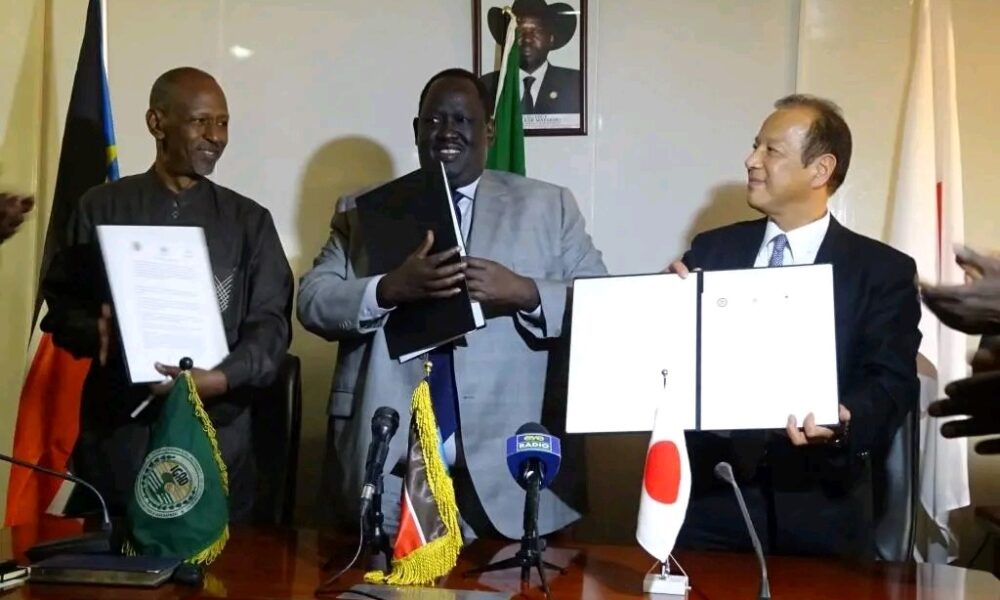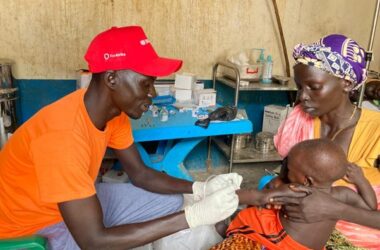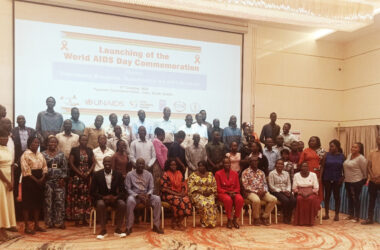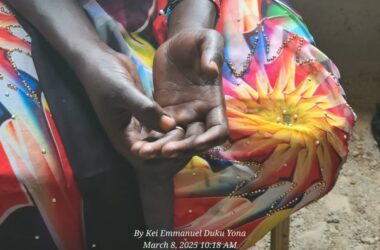By staff writer
The implementation of the Revitalized Agreement on the Resolution of the Conflict in South Sudan (R-ARCSS) continues to face significant hurdles, primarily due to the mismanagement of funds allocated for peace-building and institutional development.
Despite repeated extensions of the transitional period, critical institutions such as the National Constitutional Amendment Committee, National Human Rights Commission, and Judicial Review Commission remain underfunded. These institutions, essential for ensuring a just and equitable peace process, have been deprived of necessary resources, hindering their ability to function effectively.
A recent investigation by the Transitional National Legislative Assembly’s Public Accounts Committee revealed alarming discrepancies in the disbursement of funds allocated to the National Transitional Commission (NTC). The NTC, chaired by President Salva Kiir’s security advisor, Gen. Tut Gatluak Manime, was tasked with overseeing the implementation of the peace agreement and allocating funds to key institutions.
However, the committee’s findings indicate that a substantial portion of the USD 10 million allocated to the NTC was diverted to other projects. These include Phase II of the Security Arrangements under the Senior Presidential Advisor on Security Affairs to be used for the deployment of armed forces before integration into the National Army, National Salvation Front, a faction of rebel group who broke away from Gen: Thomas Cirilo Swaka and joined the government of National Unity, and another an unspecified amount under 9 Barrel of Crude Oil under the Special Project and other than the critical commission mandated to benefit from the funds.
On 29th May 2024, the Transitional Legislative Assembly Public Accounts Committee together with the Committee of Finance and Economic Planning, Government Assurances, Monitoring, and Evaluation (GAME) convened a meeting and summoned the Minister of Cabinet Affairs, Minister of Finance and Economic Planning, Minister of Justice and Constitutional Affairs, the Governor of Bank of South Sudan to clarify the delay in payment and non-payment of the relevant institutions and peace implementation mechanism like the National Constitution Amendment Committee, National Human Rights Council, Judicial Review Commission, etc.
The Public Accounts Committee meeting was convened according to the Transitional Constitution of the Republic of South Sudan (2011) Article 82 (1) (3) and Transitional National Legislative Assembly Conduct of Business Regulations, 2011 (Amended), Regulations 8 (1) (c) (d), 133, 134, and 135.
During the meeting, the Heads of the commission were also in attendance.
It is reported that during the meeting, the Minister of Finance and Planning stated, in a letter referenced NF/RSSJ/20-D-1, dated April 2, 2024, he communicated to the Governor of the Central Bank of South Sudan authorizing the transfer of USD 10 million to the Ministry of Cabinet Affair’s Special Projects.
The Bank of South Sudan acknowledged receipt of the authorization letter and transferred the money on 8th April.
Between mid-April and the end of May 2024, the Ministry of Cabinet Affairs Special Projects made multiple withdraws, and by the end of May, the remaining balance at the Cabinet Affairs Account Special Project accounts for SSP 8.87 billion (about USD 5.6 million).
While appearing before the Transitional National Legislative Assembly Public Accounts Committee, Dr. Martian Elia Lumoro, the Cabinet Affairs Minister acknowledged receiving payment from the central bank.
He added the money was meant to facilitate the activities of the National Constitutional Review Commission, National Constitutional Amendment Committee, National Human Rights Council Judicial Review Committee, and other government agencies as stipulated in the agreement.
The Public Accounts Committee noted that the withdrawals/payments made between 16th and 23rd April 2024, from Cabinet Affairs (General Secretariat) were used for additional projects for which the Minister failed to provide evidence of payments.
According to a report released by the Public Accounts Committee on the 06th of June, 2024, SSP 1.65 billion (about USD 1.05 million) was spent on National Salvation Front Peace implementations.
The Report further noted that USD 2 million (SSP 3.15 billion) was spent by the office of Tut Gatluak Manime, the Presidential Advisor on Security Affairs and Chairperson of the National Transitional Commission, to implement Phase II of the security arrangement.
However, the Cabinet Affairs Minister denied the transactions that took place between 13th and 31st May 2024, amounting to SSP 1.58 billion.
The Missing Money and Irregularities
The Committee noted that despite the release of the money by the Central Bank to the Ministry of Cabinet Affairs Accounts, some of the beneficiaries were not paid their money as required, while others were partially paid, affecting their operations and consequently affecting the implementation of the peace agreement.
Also, the Committee noted that the Ministry of Cabinet Affairs introduced payment for additional projects namely the 9 Barrel of Crude Oil, National Salvation Front, and other High-Level Committees, and these institutions were supervised by the Office of the Presidential Advisor on Security. According to the committee, the additional projects created were a ploy to divert money from the originally planned and intended beneficiaries because money for the additional projects was fully paid in 2022/23 under Road Map Arrears and considered a priority over other critical peace implementing institutions.
The report also detailed that though the request was made for funds for the implementation of the peace agreement, upon release by the central bank, the money was diverted to paying other “Additional Projects” contravening the Public Finance Management and Accountability Act of 2011.
The Committee further noted that Dr. Martian Elia Lumoro, the Minister of Cabinet Affairs made some changes reducing the amount to be paid to the beneficiaries without the approval/resolutions of the Cabinet Ministers.
In February 2022, while in Khartoum Lomuro, announced that the government had opened three bank accounts for the South Sudanese to contribute funds to support the implementation of the peace agreement. However, to date, the Minister has never told the public how much was contributed and what it was used for.
The three bank accounts opened are not related to the previous accounts the NTC and the Ministry of Cabinet Affairs used for payment and withdrawal from the Central Bank of South Sudan.
In 2019, an Online APA News agency reported that the South Sudan National Transitional Commission received USD 500,000 from the South Sudanese Business community towards the Implementation of the 2018 Peace plan. However, these funds remain unaccounted for.
Additionally, the government of Japan in 2019, donated USD 1 million to the National Transitional Commission to facilitate its activities. A year later again the government of Japan donated 260 metric tons (worth about USD 4 million) of nonfood items such as blankets, water containers, and tents, among others.
But even with donations from different sources, and government funding for the implementation of the peace agreement, the National Transitional Commission stands accused by a section of South Sudanese traders of not paying them for the food items supplied to the army at various military training sites.
Traders and Hotel owners in Juba are demanding more than USD150 million from the commission.
Although the Minister of Cabinet Affairs was directed by the Public Account Committee to fully pay the beneficiaries the money as requested by the Minister of Finance and Planning by the time of filing this article, The National Human Rights Council (NHRC) had not received their money.
Jacob Deng Wall, a Commissioner of the NHRC stated that the landlord has locked out all staff of council over unpaid rent arrears worth USD 48,000 for the last 12 months.
“We were only allowed to pick essentials like stamps and headed papers but computers, and the rest of the other office items are locked inside. We are forced to have meetings in the hotels or on the phone,” says Deng.
He added that before the 2013 and 2016 conflict, the commission received funding adequately from the government however after the 2018 Peace Agreement, the government stopped sending funds for their activities and the staff have gone for more than 10 months without receiving their salaries.
He further added that lack of funding prevented the commission from documenting human rights abuses in the country and monitoring the peace agreement difficult.
Lavish Spending of Government Officials
Tut Gatlauk Manime is the Presidential Advisor on Security Affairs, an Active Military officer in the ranks of General and he also serves as the Chairperson of the NTC, however, his habit of lavish spending has been severely questioned by the public.
He came under the spotlight in 2023 when he donated South Sudanese Pounds three million to Journalists as an appreciation for covering the deployment of combatants at Luri Military Centre in Juba County, Central Equatorial State.
Journalists who attended the occasion have refused to comment on this alleged donation. There are also other donations he has made to different entities in the recent years.
According to a joint document titled “Comparative Analysis of Wage Bills & Inflation-Indexed Adjustment of Public Sector Salaries and Wages in South Sudan” presented during the first National Economic Conference in Juba held on the 6th September 2023 by the University of Juba in collaboration with The Sudd Institute and Ebony Centre for Strategic Studies, all Presidential Advisors’ Monthly salary in 2011 was USD 3,547 (SSP 10,500) monthly.
However, in 2022, a proposal was tabled to increase the monthly salary to SSP 1.45 million on top of a monthly allowance of SSP 291, 757.
That means if the new salary proposed was effective for the financial year 2021/22, Manime would have earned SSP 17.5 million as a Presidential Advisor.
Also, since the National Transitional National Commission was established in 2018 after the signing of the Revitalized Peace Agreement, Manime as the Chairperson was entitled to receive SSP 553,636 in 2021/22 according to the new proposed salary structure, plus SSP 110,727 as monthly basic allowances.
However, Manime’s spending has been questioned by the public especially when civil servants have not been paid their salaries for the last 11 months.
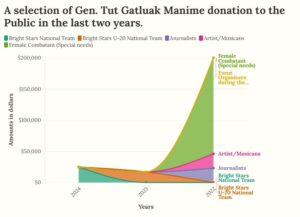
Other Government spendings and Call for reforms
In 2018 when President Kiir and Dr. Riak Machar signed the peace agreement, the two rival leaders agreed to form a government of National Unity. This was to be headed by President Salva Kiir deputized by Dr. Machar and 4 other Vice Presidents for 36 months after which elections would be conducted.
Three years after the agreement was signed, Members of parliament (MPs) voted and extended the term limit of the President till 2021. Two weeks after the vote, President Kiir decided to reward each MP with USD 40,000 dubbed as a car loan. This sparked public outcry particularly when the local populations and international communities donated unaccounted money for peace implementation.
Between 2020 and 2022, the Guardian Newspaper investigations revealed the NTC commission spent USD 135,000 on renovating the houses of two politicians. These said houses are of Taban Deng Gai and the Widow of Dr. John Garang, Rebecca Nyandeng De Mabior all of whom are Vice Presidents in the current transitional period. However, South Sudan Cabinet Minister Dr. Martin Elia Lomuro said the money was spent as planned in the peace agreement.
Dr. Abraham Maliet Mamer, an Economic Analyst urges the government to prioritize funding critical institutions so the key milestones in the peace agreement are met ahead of the December 2027 elections and avoid further extension.
He attributes the last extension to the ongoing Sudan conflict which has disrupted the normal flow of South Sudan oil exports preventing the country from generating revenue and affecting the functionality of critical institutions implementing the peace agreement.
The Economist stated that with ongoing negotiations between the government of South Sudan and the worrying factions in Sudan’s conflict on plans to resume South Sudan’s oil exports, the peace agreement implementation will face fewer challenges.
“The peace stalled because the government had no money, but now the oil has started flowing, definitely the pending task will be implemented. The government needs to identify priorities and direct funds towards particular institutions so that people can move towards the path of peace. Government has no option than to implement peace,” elaborates Dr. Abraham.
This story is made possible with the support of InfoNile.

